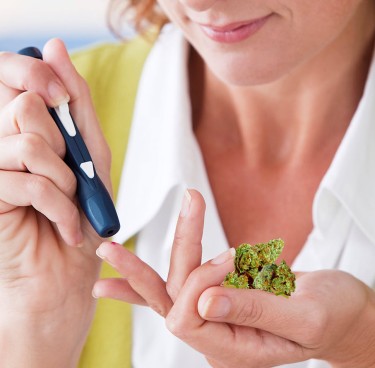
The Fit Stoner: How Cannabis Correlates with Better Metabolic Health
The classic image of lazy, gluttonous stoners gorging on junk food on the couch has prevailed through decades of prohibition. But emerging research reveals cannabis consumers actually exhibit healthier metabolic indicators than non-users. It’s time to rethink the tired old stereotypes.
Lower Diabetes Risk: Not Just Munchies After All
A new meta-analysis found cannabis use is associated with a nearly 50% lower risk of developing Type 2 diabetes compared to non-users.
This builds on previous epidemiological studies suggesting cannabis consumers have lower BMI, better insulin regulation, and overall reduced diabetes prevalence.
At first glance, this seems counterintuitive.
You’d expect the late night Taco Bell runs to cause higher rates of metabolic disorders. But it seems those cravings haven’t overcome the more subtle physiological benefits of cannabis compounds.
The active ingredients THC and CBD apparently interact positively with glucose metabolism and insulin levels. Exact mechanisms remain unclear, but cannabis seems to correlate with maintained metabolic health rather than decline.
For medical cannabis patients especially, this is great news. Those using cannabis to manage pain and other conditions already get symptom relief without opioids’ side effects. Now it appears their medicine may also reduce risks of diabetes, heart disease, and stroke.
While more research is still needed, the consistent epidemiological findings shatter tired stereotypes of the unhealthy stoner. Turns out those munchies may not be so bad after all!
Cannabis Consumers Have Lower BMI than Non-Users
Related to lower diabetes risk, surveys consistently show regular cannabis users have lower mean BMI than non-users.
For example, a major 2021 study of over 560,000 people found obesity rates were 25% lower among cannabis users than non-users. Again, this flies against the image of the pothead bingeing on junk food.
Lower BMI likely relates to cannabis interacting with metabolism, gut microbiome, and endocannabinoid receptors that regulate hunger signals. While cannabis can stimulate appetite acutely, its biological effects appear to promote stable body weight over time.
These findings shatter stereotypes of lazy pot smokers getting fat from munchies and inactivity. In reality, responsible cannabis consumers tend to be fitter than Americans generally.
Cannabis Culture Promotes Exercise and Being Active
From hikes to yoga, many cannabis enthusiasts integrate plant medicine into healthy, active lifestyles. Contrary to stereotypes, cannabis’ effects are quite compatible with exercise and movement.
Pre-workout cannabis can enhance enjoyment and mindfulness during physical activity. Cannabis style cultures like 420 Games are bringing users together around sports and competition.
Far from sitting around all day, many passionate cannabis lovers nourish their minds and bodies through healthy diets, exercise, socializing, and time in nature. Using cannabis consciously often supports values of holistic wellbeing.
Of course, some still battle lack of motivation and inactivity when overindulging. Moderation and intention remains key. But the trope of lazy stoners makes little sense in the context of cannabis culture today.
Reconceptualizing the Modern Cannabis Consumer
While the image of the aimless pothead persists culturally, the reality of today’s average cannabis consumer is remarkably different. They tend to be active, health conscious folks using cannabis moderately to enhance quality of life.
It’s time for media portrayals of cannabis users to catch up with the science. Tired stereotypes and stigma only serve vestigial prohibitionist agendas.
In legal states especially, responsible adults of all ages use cannabis for wellness, activity, spirituality and medical relief. The old image of the loser pothead wasting away has no factual basis.
What studies show again and again is that cannabis, when used mindfully, correlates strongly with healthy metabolic indicators and lifestyle practices. The herb’s benefits may extend far beyond the high itself.
None of this means cannabis is a miracle cure or panacea. But we must acknowledge the emerging correlations with improved health outcomes. Through further research and education, cannabis still has so much to offer society.
The Sticky Bottom Line
As a passionate cannabis consumer for nearly twenty years, I’m living proof that responsible use does not equate to being a lazy, unhealthy stoner. Despite daily consumption, I’m now in the best shape of my life in my mid-30s.
While cannabis isn’t for everyone, I’ve learned to integrate it into my lifestyle in a conscious way that enhances wellbeing. It inspires me to exercise regularly, eat healthy, and spend time in nature. My meditation practice is also deepened by cannabis’ effects on mindfulness and inner reflection.
Do I get those late night Taco Bell cravings now and then? Of course. But overall, cannabis has not led me to gain weight or become inactive. If anything, its biological and psychological properties help motivate me to live energetically.
I strongly prefer cannabis over alcohol these days. Hangovers depress me, disrupt productivity, and feel awful. With cannabis, I wake up refreshed without headaches or nausea. Moderating dosage is important, but cannabis allows me to relax and socialize without toxic side effects.
My success integrating cannabis healthily depends on intention. I take periodic tolerance breaks to reset. Getting overly high all day breeds laziness for me, so I avoid that through reasonable doses. Cannabis works best for me as an enhancement in balance with other priorities.
I occasionally use cannabis when working out. It helps me get into a focused, meditative zone during long runs. Recovery also feels faster when using CBD salves for sore muscles. But I avoid getting really stoned before intense exercise. Moderation and self-awareness is crucial.
Could cannabis play a role in my metabolic health? I believe so. I tested with low blood sugar and A1C levels at my last physical. Anecdotal, sure, but it lines up with emerging diabetes research showing lower risk among consumers.
Do I give cannabis full credit for my vitality? No. Plenty of factors are at play. But I suspect cannabis compounds interact with my physiology beneficially beyond just the high. This magical plant supports human health in many mysterious ways we are only starting to understand.
At the end of the day, how you integrate cannabis depends on the individual. Not everyone enjoys the same benefits I do. Some may be more prone to overuse and lethargy. The key is finding balance and moderation in your personal relationship.
But the tired old image of the lazy, useless stoner just doesn’t reflect reality today. Responsible adults are proving cannabis can augment healthy, engaged living. I’m proud to be part of the modern cannabis culture thriving beyond outdated cliches.
This little plant and I still have so much to experience together!
CANNABIS AND DIABETES, READ ON…
HOW CANNABIS COULD HELP PATIENTS WITH DIABETES!
- SEO Powered Content & PR Distribution. Get Amplified Today.
- PlatoData.Network Vertical Generative Ai. Empower Yourself. Access Here.
- PlatoAiStream. Web3 Intelligence. Knowledge Amplified. Access Here.
- PlatoESG. Automotive / EVs, Carbon, CleanTech, Energy, Environment, Solar, Waste Management. Access Here.
- PlatoHealth. Biotech and Clinical Trials Intelligence. Access Here.
- ChartPrime. Elevate your Trading Game with ChartPrime. Access Here.
- BlockOffsets. Modernizing Environmental Offset Ownership. Access Here.
- Source: http://cannabis.net/blog/opinion/the-fit-stoner-does-cannabis-spell-the-end-of-diabetes-and-better-metabolic-health-for-regular




